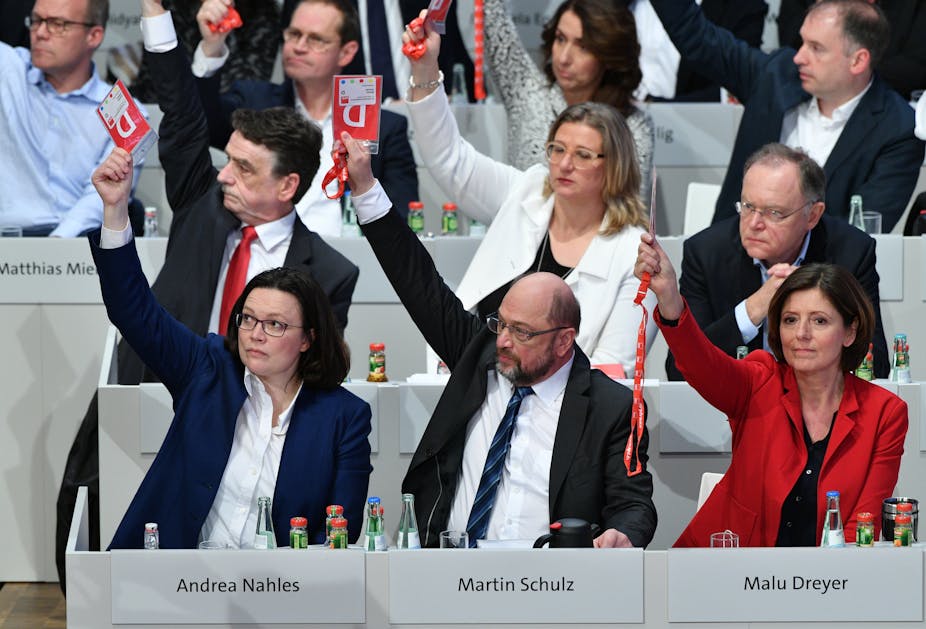After tense debate, Germany’s Social Democratic Party (SPD) conference in Bonn gave the go-ahead for the party to enter formal government coalition negotiations with the union parties, Angela Merkel’s Christian Democratic Union (CDU) and its Bavarian sister party the Christian Social Union (CSU).
If successful, the three parties will form a new grand coalition, known as the “GroKo”, continuing the configuration that held power in Germany between 2013 and the September 2017 elections. Coalition talks were endorsed by a slim majority on January 22 – only 54.6% of the 600 party delegates.
The immediate reaction was one of relief. Had the vote failed, SPD party leader Martin Schulz’s career would have been on the line. He made a risky public U-turn over the talks. Immediately after the September 2017 general election, he had refused to enter a government coalition and committed his party to an opposition role in the Bundestag, the German parliament. After the failure of the experimental “Jamaica” coalition round between the union parties, the Greens and the neo-liberal Free Democratic Party (FDP), Schulz reconsidered and started campaigning vigorously for a new GroKo.
Schulz’s relief was shared by the wider political establishment. Had the conference rejected the talks, the alternatives would have been inconclusive at best and, at worst, might have realised Germany’s historic fear of government instability. If the GroKo had been rejected even before talks began in earnest, the federal president, Frank-Walter Steinmeier, would have had to choose between naming a minority government under Merkel, the current chancellor, or calling fresh elections.
Schulz still under pressure
For Schulz, relief over the conference outcome will be short-lived. His political future remains far from certain.
First, his dramatic U-turn over the GroKo not only dented his personal credibility as SPD leader, but opened up a fundamental divide over the future direction of the party. At the Bonn conference, fear of even greater electoral losses than the historic low of just over 20% gained in 2017 buttressed support for the party line. The pro-GroKo movement is backed by 12 SPD mayors from major cities and a broad-based alliance spanning the various party factions and including several party dignitaries.
Spearheading the “NoGroKo” campaign is Kevin Kühnert, the head of the party’s Jusos youth organisation. Controversially dubbed the “Dwarves Revolt” by Alexander Dobrindt, the regional chair of the CSU, the NoGroKo movement draws support from a party members calling for a fundamental renewal of the party to arrest its alarming decline in the polls. Kühnert has voiced concerns about an “eternal opposition” role for the SPD.

His claim that he is sick of seeing the party run into the same brick wall time and time again struck a chord within the party and mobilised opposition to the leadership.
The NoGroKo group’s main target is in fact its own party’s leadership. The movement believes that the current party bosses are complacent and out of touch with the party grassroots. Now the genie is out of the bottle, even a successful conclusion to the GroKo negotiations won’t force it back in. Schulz has not overcome an existential party crisis, he has merely postponed it.
Challenge from the party grassroots
At the Bonn party conference, Schulz faced down the fundamental rejection of any grand coalition staged by the NoGroKo movement. His next intra-party challenge will be fought on a different level entirely. If all goes smoothly – by no means a foregone conclusion – a government coalition agreement with the union parties could be finalised as early as next month.
But before the SPD can enter a new government, the coalition agreement must be endorsed by the party’s 440,000 members. The whole processs of coalition negotiation and endorsement is likely to take until Easter at the earliest. Unfortunately for Schulz, the delegates at the Bonn conference and the grassroots membership represent two entirely different intra-party clienteles. To convince both will stretch Schulz’s damaged credibility to its limits.
In appealing to the grassroots, Schulz is hampered by the fact that the broad guidelines so far agreed for a new coalition do not amount to the kind of new direction envisaged by the SPD’s supporters. The position paper released by the negotiators was quickly dismissed by FDP leader Christian Lindner as a “rehash of the old Grand Coalition”.
Worse, 63% of a representative poll of all Germans believe that the CDU has asserted its aims more successfully in the guideline coalition agreement than the SPD. While the agreement includes some SPD initiatives in healthcare and education, measures to protect the vulnerable are unlikely to go far enough for many SPD members.
For SPD members, the keyword is “citizen security” – a term that translates as “social equity”. Many will not be prepared to support a new GroKo that does not aim for genuine reforms to close the gap between rich and poor. The SPD leadership has already angered the union parties by suggesting that its negotiators will now be looking to improve the SPD’s deal in key areas of labour, health and refugee policy. In particular, there are calls from within the SPD to end unjustified fixed-term labour contracts, reform the current “two-class” health system that privileges the wealthy, and moderate the hard line on refugee and integration policy adopted by the Bavarian CSU.
All this means that Schulz can expect a rollercoaster ride over the coming months.

